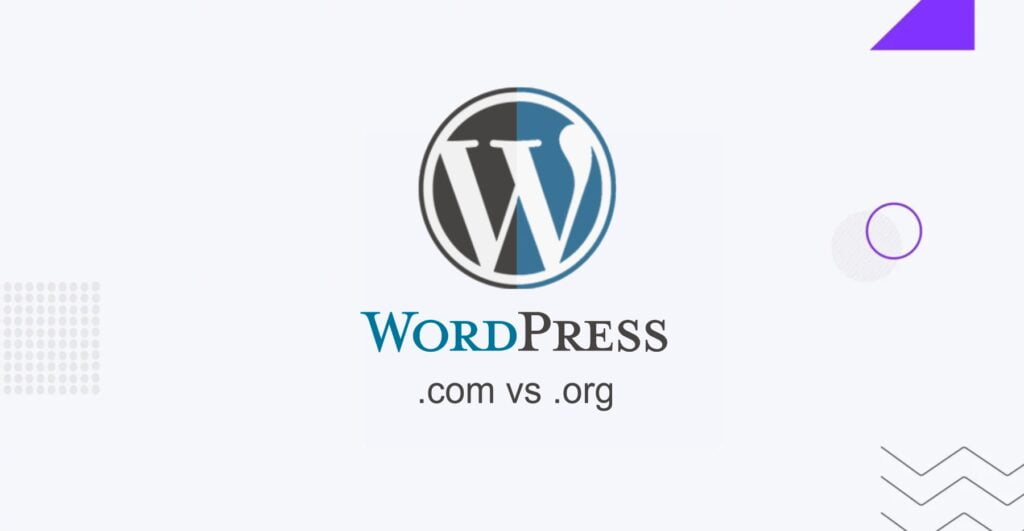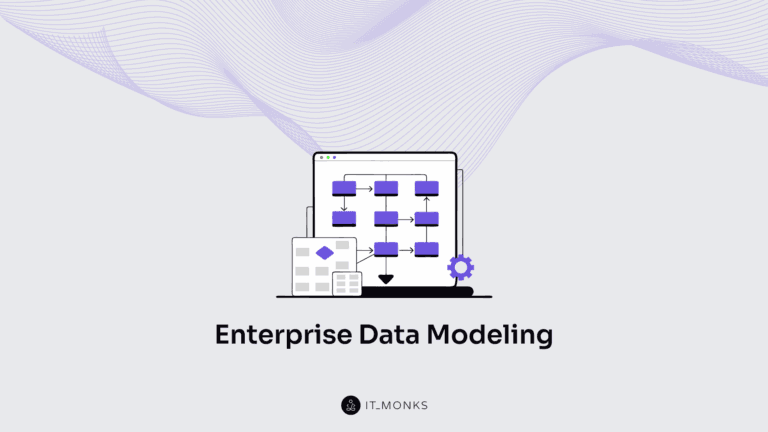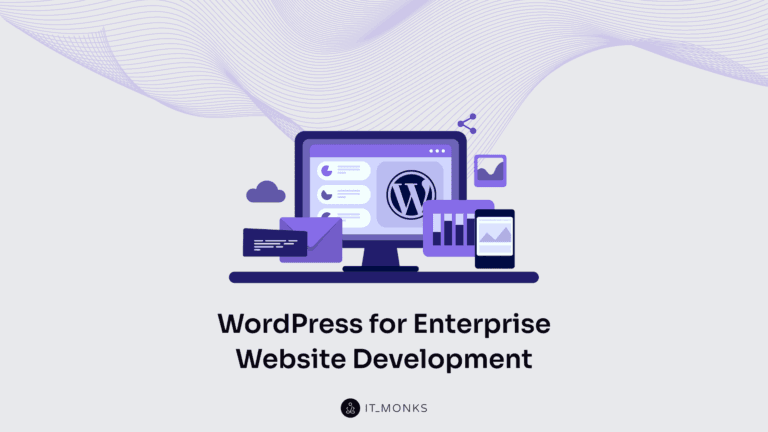WordPress.com vs WordPress.org: How to Choose One?
Table of Contents

When you create a WordPress website, understanding the distinction between WordPress.org vs WordPress.com is crucial. Many newcomers often find themselves entangled in the debate of which is superior, but neither reigns supreme. Instead, the focus should be on discerning the differences between WordPress.com’s managed hosting and a self-hosted WordPress site, typically facilitated through third-party hosting services.
WordPress.com offers a managed hosting solution, providing users with a simplified and hassle-free approach to website creation. On the other hand, WordPress.org empowers users to self-host their websites, granting them greater flexibility and control over their online presence.
Which option is right for you? The answer depends on your specific needs and preferences. If you prioritize ease of use and minimal maintenance, WordPress.com might be the way to go. However, if you seek customization options and full autonomy over your website, opting for a self-hosted WordPress.org site could be more suitable.
To delve deeper into creating a WordPress website and gain valuable insights into making the right choice between WordPress.com and .org, check out our comprehensive guide on how to develop a WordPress website.
What is WordPress.org?
WordPress.org is a resource center that is the primary source for downloading WordPress software. However, it differs from WordPress.com in that users must independently obtain a hosting service, install WordPress, and manage ongoing maintenance tasks independently.
Apart from being a download platform, WordPress.org is also a central hub for the thriving open-source WordPress community. Users can explore resources to enhance their understanding of WordPress, actively contribute to its development, and interact with fellow enthusiasts. It’s important to note that while WordPress.org provides valuable support and resources, it does not facilitate website creation itself, nor does it function as a web hosting service.
WordPress.org Pros and Cons
WordPress.org, often called WordPress, is a widely popular content management system (CMS) known for its versatility and ease of use. Below, we’ll explore some of the key advantages and disadvantages of using WordPress.org:
| Pros | Cons |
|---|---|
| User-Friendly: WordPress boasts an intuitive interface, making it easy for users to navigate and manage their websites. Editing, updating, and customizing content is straightforward, thanks to its user-friendly layout. | Open-Source: Being open-source allows for flexibility and collaboration, making sharing code and working with external parties easy. However, this also poses security risks, as hackers can exploit vulnerabilities in the shared code. |
| Abundance of Themes: WordPress offers a vast library of themes that users can choose from to customize the look and feel of their websites. However, creating custom themes from scratch can be time-consuming, especially for beginners who may not be proficient in coding. | Speed Challenges: While WordPress allows for the creation of custom themes, coding can be time-consuming, particularly for novices. Compared to other CMS platforms with pre-made templates, building a website from scratch on WordPress may require more time and effort. |
| Regular Updates: WordPress regularly releases updates with new features, themes, and tools to enhance website functionality. However, implementing these updates can be a hassle, as they may cause website layout changes that require code adjustments. |
WordPress.org offers a user-friendly platform with a wide range of customization options, making it a top choice for website creation. However, users should be aware of potential security risks associated with its open-source nature and the time investment required for coding custom themes. Additionally, managing updates can sometimes be cumbersome, requiring careful attention to maintain website functionality.
What is WordPress.com
WordPress.com, operated by Automattic, is a hosted blogging service launched in 2005. It utilizes the WordPress.org software with the most popular WordPress plugins and modifications. Offering a preinstalled WordPress website, it serves as a web hosting service, managing all backend tasks for users. However, unless they opt for a paid service, users cannot use their URL with WordPress.com, and it provides less flexibility than self-hosted WordPress sites. Despite these limitations, WordPress.com remains a user-friendly option for those seeking to create blogs or websites without dealing with technical complexities.
WordPress.com Pros and Cons
WordPress.com offers a range of benefits for users looking to create a website or blog, but it also has drawbacks. Here’s a breakdown of the pros and cons:
| Pros | Cons |
|---|---|
| Free and Open-Source | Less Flexibility |
| Preinstalled WordPress | Domain Name Limitations |
| Hosting Service | Steep Learning Curve |
| Ease of Use | Costs Can Add Up |
| Potential Plugin Conflicts |
WordPress.com provides a free, open-source content management system with preinstalled WordPress, making it easy to start without worrying about backend setup. However, users may experience limitations in flexibility and domain name options and may face a learning curve. Additionally, while the platform is free, expenses can accumulate with additional features, and potential plugin conflicts may arise, causing site disruptions.
WordPress.org vs .com

In this comparison of WordPress.org vs .com, we’ll delve into various aspects, including how they operate, pricing models, customization options, security features, analytics capabilities, monetization potential, e-commerce functionalities, SEO steps for WordPress, and branding opportunities. By examining these key factors, we aim to comprehensively understand the differences between these two WordPress platforms, helping you make informed decisions based on your specific needs and preferences.
How WordPress.org Works
When setting up a website on WordPress.org, several key steps are involved.
- Firstly, you must secure a domain name and select a hosting provider.
- Once that’s done, you can easily install WordPress using one-click installers commonly provided by hosting services.
- Next, choose a suitable theme, either free or premium, from the wide range offered by WordPress.org to complement your website’s aesthetics.
- Following this, add content by creating posts and pages, then customize your website to reflect your brand identity.
- Utilizing plugins is crucial for enhancing functionality, and optimizing your website for speed ensures an optimal user experience.
How WordPress.com Works
When creating a website on WordPress.com, users should consider several key factors.
- Firstly, they must select a suitable plan based on their needs and budget.
- Next, they can choose a domain name using a free subdomain or purchasing a custom domain.
- WordPress.com offers a range of pre-designed stylish WordPress themes for customization, and users can add content by creating posts and pages.
- Additionally, users can enhance their site’s functionality by installing available plugins within the limitations of their chosen plan.
WordPress.org Pricing
The cost of running a website on WordPress.org can vary depending on several factors. Users must pay for a domain name and hosting services, with prices ranging from a few dollars per month to more significant amounts for premium hosting plans.
WordPress.org is technically free, but there are several associated costs when setting up a website. Here’s a breakdown of the potential costs:
- Domain Name: The cost is typically around $12 per year. However, this could vary depending on the domain name registrar and your chosen domain.
- Hosting: Prices start from around $2.95 per month. The cost of hosting can vary significantly depending on the hosting company, the type of hosting plan (shared, VPS, dedicated), and any additional features included.
- Themes: While some are free, premium themes can cost $20 to $100 or more. The cost may depend on the theme’s complexity and features.
- Plugins: While many are free, some may have a price tag. Premium plugins can range from a few dollars to several hundred dollars, depending on their functionality and developer support.
- Security: Security measures such as SSL certificates, firewalls, and malware scanning can start from around $50 annually. However, the cost may increase depending on the level of security required and any additional security services or tools used.
- Developer Fees: If you require assistance from a web designer or developer, professional website design costs can vary widely depending on their experience, expertise, and the scope of work. Hourly rates typically range from $50 to $150 or more, and total project costs could exceed $10000 for complex websites.
WordPress.com Pricing
WordPress.com offers several plans tailored to different user needs.
- Free: WordPress.com offers a free basic plan, but it comes with limited features.
- Paid Plans: The paid plans start from around $16 per month. The cost can vary depending on the plan you choose.
- Domain Name: Free for one year if billed annually.
- Storage: Depending on the plan, it ranges from 1GB to 200 GB.
- Support: Depending on the plan, various support options are available, including email support, chat support, 24/7 priority chat support, community forums, and guides.
- Plugins: Only available for Business and e-commerce plans.
- Custom Themes: These are only available for business and e-commerce plans.
WordPress.org Customization Features
WordPress.org provides extensive customization options, allowing users to tailor their websites to their needs. Users have full control over themes and can choose from thousands of free and premium options or create their own. Additionally, users can install plugins to add functionality and customize the design using CSS or HTML. This flexibility enables users to create highly customized websites tailored to their branding and design preferences.
WordPress.com Customization Features
WordPress.com offers customization features that are within each plan’s limitations. Users can choose from pre-designed themes using the built-in customization tools. However, customization options may be more limited than those of WordPress.org, especially for users on lower-tier plans. Additionally, users may have restrictions on installing plugins or modifying the site’s code, depending on their plan.
WordPress.org Security
WordPress.org provides robust security features to help protect websites from potential threats. Users can enhance security by regularly updating WordPress core, themes, and plugins to the latest versions. Additionally, users can implement security plugins, enable SSL certificates for encrypted connections, and implement strong passwords and user authentication measures to safeguard their websites against malicious attacks.
WordPress.com Security
WordPress.com prioritizes security by automatically updating WordPress core, themes, and plugins to the latest versions. The platform also employs security measures such as SSL encryption, DDoS protection, and firewalls to prevent unauthorized access and attacks. WordPress.com’s dedicated security team monitors suspicious activity and responds to security threats promptly, providing users with a secure hosting environment for their websites.
WordPress.org Analytics
With WordPress.org, users have the flexibility to integrate any analytics service they prefer. They can choose from various analytics tools such as Google Analytics, Jetpack Stats, or other third-party plugins to track website traffic, user behavior, and other important metrics. This allows users to gain valuable insights into their website’s performance and make informed decisions to optimize their content and marketing strategies.
WordPress.com Analytics
WordPress.com offers built-in analytics features that give users basic insights into their website’s performance. Users can directly view statistics such as page views, visitors, and popular content from their WordPress.com dashboard. However, more advanced analytics features may be limited depending on the user’s plan, and users may need to upgrade to higher-tier plans or integrate third-party analytics tools for more comprehensive data analysis.
WordPress.org Monetization
WordPress.org offers various monetization options for websites, including the ability to display ads. Users can join advertising networks like Google AdSense or affiliate marketing programs to generate website revenue. Additionally, users can sell products or services directly through their websites using e-commerce plugins or integrate payment gateways to accept payments.
WordPress.com Monetization
WordPress.com imposes restrictions on monetization options depending on the user’s plan. While higher-tier plans such as Premium, Business, and e-commerce allow users to monetize their websites through advertising and e-commerce, the Free and Personal plans have limitations. Users on lower-tier plans may have WordPress.com ads displayed on their websites, and monetization features such as ad revenue sharing are unavailable.
WordPress.org E-commerce Feature
WordPress.org provides robust e-commerce capabilities through various plugins such as WooCommerce. Users can create fully functional online stores to sell products or services, manage inventory, process payments, and handle shipping and taxes. With extensive customization options and a wide range of plugins and extensions, users can tailor their e-commerce websites to their specific needs and scale their businesses effectively.
WordPress.com E-commerce Feature
WordPress.com offers e-commerce features through the e-commerce plan, which includes integration with WooCommerce. Users can create online stores with features for product listings, payment processing, inventory management, and shipping options. However, e-commerce functionality is unavailable on lower-tier plans, and users may need to upgrade to the e-commerce plan to access these features.
WordPress.org SEO
WordPress.org offers powerful SEO capabilities to help websites rank higher in search engine results. Users can optimize their websites for search engines by configuring SEO settings, creating SEO-friendly URLs, adding meta tags and descriptions, optimizing images, and using SEO plugins such as Yoast SEO or Rank Math. WordPress.org’s clean code and responsive design also contribute to better SEO performance.
WordPress.com SEO
WordPress.com includes basic SEO features to help improve website visibility in search engine results. Users can optimize their content for search engines by adding meta tags, descriptions, and alt text to images. However, some advanced SEO features may be limited depending on the user’s plan, and users may need to upgrade to higher-tier plans or install third-party SEO plugins for more comprehensive SEO optimization.
WordPress.org Branding
With WordPress.org, users have complete control over branding, content ownership, and the ability to write about any topic. Users can create their brand identity by customizing themes, logos, and colors to reflect their unique style and personality. Additionally, users have full ownership of their content, allowing them to monetize their websites, build their audience, and establish their authority in their respective niches.
WordPress.com Branding
WordPress.com imposes branding and content ownership restrictions depending on the user’s plan. Users on lower-tier plans may have WordPress.com branding displayed on their websites, and customization options may be limited. Additionally, users may be subject to content guidelines and restrictions, limiting their ability to write about specific topics or monetize their content fully.
WordPress.com vs WordPress.org: Which One to Choose?
Choosing between WordPress.org and.com depends on your needs, preferences, and goals. Here’s a breakdown to help you decide:
Choose WordPress.org if:
- You want complete control over your website, including customization options, themes, and plugins.
- You’re comfortable managing your website’s hosting, domain registration, and technical aspects.
- You plan to monetize your website through ads, e-commerce, or other means.
- You need advanced SEO capabilities and flexibility in analytics integration.
- You’re willing to invest time and potentially money into building and maintaining your website.
Choose WordPress.com if:
- You prefer a hassle-free setup with hosting and domain provided by WordPress.com.
- You’re looking for simplicity and ease of use, with less emphasis on customization.
- You don’t want to worry about updates, backups, and technical maintenance.
- You’re not planning to monetize your website extensively or need advanced e-commerce features.
- You’re starting a personal blog or small website and don’t require extensive customization or control.
WordPress.org is ideal for users who seek full control, flexibility, and scalability for their website, especially those with business or professional needs. On the other hand, WordPress.com is suitable for beginners, personal bloggers, or those who prefer a more straightforward and managed approach without the need for extensive customization or technical involvement. Consider your specific requirements and preferences carefully to make the best choice for your website.
Conclusion
The confusion arising from the similarity between WordPress.com and WordPress.org can be challenging for beginners. We hope this article has helped clarify the key distinctions between the two platforms.
Whether you opt for WordPress.org or WordPress.com to build your website, seeking assistance from a professional team of expert WordPress developers is always advisable. At IT Monks, we craft impressive, secure, and finely-tuned WordPress websites. Feel free to contact us to discuss your project!
FAQ
- Can I switch from WordPress.com to WordPress.org?
Yes, it is possible to migrate from WordPress.com to WordPress.org. You can export your content from WordPress.com and import it into a self-hosted WordPress.org site. However, keep in mind that while the content can be transferred, some features and functionalities may differ between the two platforms, so you may need to adjust your website accordingly after the migration.
- Does WordPress.org cost money?
Although WordPress.org software is free, there are various expenses to factor in when establishing a website. These include the domain name (approximately $12 per year), hosting (starting from around $2.95 per month), themes, plugins, security measures, and possibly developer fees. Therefore, while WordPress.org is technically cost-free, launching a site will entail some financial outlay.
- WordPress.com vs WordPress.org – Which is better for e-commerce?
WordPress.org is generally considered better suited for e-commerce websites due to its flexibility and extensive range of plugins, particularly WooCommerce. With WordPress.org, you can fully control your website and customize it to meet your specific e-commerce needs. You can also integrate various payment gateways, manage inventory, and utilize advanced e-commerce features. rnrnOn the other hand, while WordPress.com does offer e-commerce functionality, it may be more limited compared to WordPress.org, especially on lower-tier plans. Therefore, if you require robust e-commerce capabilities and complete control over your online store, WordPress.org is likely the better choice.
Contact
Don't like forms?
Shoot us an email at [email protected]

Send a Project Brief
You are currently viewing a placeholder content from Facebook. To access the actual content, click the button below. Please note that doing so will share data with third-party providers.
More InformationYou are currently viewing a placeholder content from Instagram. To access the actual content, click the button below. Please note that doing so will share data with third-party providers.
More InformationYou are currently viewing a placeholder content from X. To access the actual content, click the button below. Please note that doing so will share data with third-party providers.
More Information


